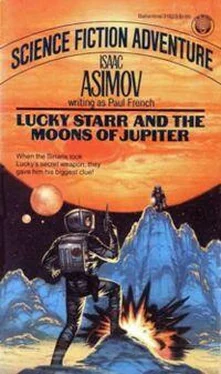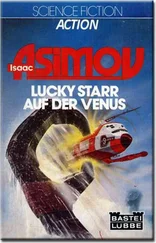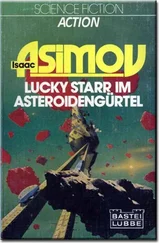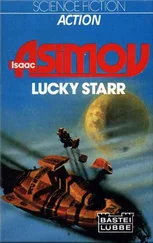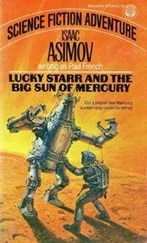Isaac Asimov - Lucky Starr The And The Moons of Jupiter
Здесь есть возможность читать онлайн «Isaac Asimov - Lucky Starr The And The Moons of Jupiter» весь текст электронной книги совершенно бесплатно (целиком полную версию без сокращений). В некоторых случаях можно слушать аудио, скачать через торрент в формате fb2 и присутствует краткое содержание. Год выпуска: 1984, ISBN: 1984, Издательство: Ballantine Books, Жанр: Фантастика и фэнтези, на английском языке. Описание произведения, (предисловие) а так же отзывы посетителей доступны на портале библиотеки ЛибКат.
- Название:Lucky Starr The And The Moons of Jupiter
- Автор:
- Издательство:Ballantine Books
- Жанр:
- Год:1984
- ISBN:SBN 0-345-31623-1
- Рейтинг книги:5 / 5. Голосов: 1
-
Избранное:Добавить в избранное
- Отзывы:
-
Ваша оценка:
- 100
- 1
- 2
- 3
- 4
- 5
Lucky Starr The And The Moons of Jupiter: краткое содержание, описание и аннотация
Предлагаем к чтению аннотацию, описание, краткое содержание или предисловие (зависит от того, что написал сам автор книги «Lucky Starr The And The Moons of Jupiter»). Если вы не нашли необходимую информацию о книге — напишите в комментариях, мы постараемся отыскать её.
Lucky Starr The And The Moons of Jupiter — читать онлайн бесплатно полную книгу (весь текст) целиком
Ниже представлен текст книги, разбитый по страницам. Система сохранения места последней прочитанной страницы, позволяет с удобством читать онлайн бесплатно книгу «Lucky Starr The And The Moons of Jupiter», без необходимости каждый раз заново искать на чём Вы остановились. Поставьте закладку, и сможете в любой момент перейти на страницу, на которой закончили чтение.
Интервал:
Закладка:
If ever the ancient belief of the "music of the spheres" could be said to have come literally true, it was in that hum of hyperatomics that was the very essential of space flight.
Panner said, "We're past Jupiter Nine's escape velocity now, which means we can coast without danger of falling back to its surface."
Lucky said, "That means we're in free fall down to Jupiter."
"With fifteen million miles to fall, yes. Once we've piled up enough velocity to make it worthwhile, we'll shift to Agrav."
, He took a watch out of his pocket as he spoke. It was a large disc of gleaming, featureless metal. He pressed a small catch, and luminous figures appeared upon its face. A glowing line of white encircled it, turning red in a sweeping arc until the redness closed in upon itself and the arc turned white again.
Lucky said, "Are we scheduled to enter Agrav so soon?"
"Not very long," said Panner. He placed the watch on the table, and they ate silently.
Panner lifted the watch again. "A little under a minute. It should be completely automatic." Although the chief engineer spoke calmly enough, the hand that held the watch trembled very slightly.
Panner said, "Now," and there was silence. Complete silence.
The hum of the hyperatomics had stopped. The very power to keep the ship's lights on and its pseudo-grav field in operation were now coming from Jupiter's gravitational field.
Panner said, "On the nose! Perfect!" He put away his watch, and though the smile on his broad, homely face was a restrained one, it virtually shouted relief. "We're actually on an Agrav ship now in full Agrav operation."
Lucky was smiling, too. "Congratulations. I'm pleased to be on board."
"I imagine you are. You worked hard enough for it. Poor Donahue."
Lucky said gravely, ''I'm sorry I had to push the commander so hard, but I had no choice. One way or another, I had to be on board."
Panner's eyes narrowed at the sudden gravity in Lucky's voice. "Had to be?"
"Had to be! It seems almost certain to me that on board this ship at the present moment is the spy we're looking for."
10. In the Vitals of the Ship
Panner stared blankly. Then, "Why?"
"The Sirians would certainly want to know how the ship actually worked. If their method of spying is foolproof, as it has been till now, why not continue it on board the ship?"
"What you're saying, then, is that one of the fourteen men on board the Jovian Moon is a robot?"
"That is exactly what I mean."
"But the men aboard ship have been chosen long since."
"The Sirians would know the reasons for choosing and the method of choice just as they know everything else about the project and they would maneuver their humanoid robot so as to have him chosen."
"That's giving them a lot of credit," muttered Panner.
"I admit it," said Lucky. "There is an alternative."
"Which is?"
"That the humanoid robot is aboard as a stowaway."
"Very unlikely," said Panner.
"But quite possible. It might easily have boarded the ship in the confusion before the commander made his christening speech. I tried to watch the ship then, but it was impossible. Furthermore, nine tenths of the ship seems to be made up of engine compartment, so there must be plenty of room to hide."
Panner thought about it. "Not as much room as you might think."
"Still we must search the ship. Will you do that, Dr. Panner?"
"I?"
"Certainly. As chief engineer, you would know the contents of the engine compartment better than anyone else. We'll go with you."
"Wait. It's a fool's errand."
"If there is no stowaway, Dr. Panner, we have still gained something. We'll know we can restrict our consideration to the men legally aboard ship."
"Just three of us?"
Lucky said quietly, "Whom can we trust to help us, when anyone we might ask might be the robot we're looking for? Let us not discuss this any further, Dr. Panner. Are you willing to help us search the ship? I am asking your help in my capacity as a member of the Council of Science."
Reluctantly Panner got to his feet. "I suppose I must then."
They clambered down the hand holds of the narrow shaft leading to the first engine level. The light was subdued and, naturally, indirect, so that the huge structures on either side cast no shadow.
There was no sound, no slightest hum to indicate activity or to show that vast forces were being trapped and dealt with. Bigman, looking about, was appalled to find that nothing seemed familiar; that of the ordinary workings of a space ship, such as that of their own Shooting Starr, nothing seemed left.
"Everything's closed in," he said.
Panner nodded and said in a low voice, "Everything is as automatic as possible. The need for human intervention has been cut to the minimum."
"What about repairs?"
"There shouldn't have to be any," the engineer said grimly. "We have alternate circuits and duplicated equipment at every step, all allowing for automatic cut-in after self-check."
Panner moved ahead, guiding them through the narrow openings but moving always slowly as though at any moment he expected someone, or some thing, to hurl itself murderously upon them.
Level by level, methodically moving out from the central shaft along the side channels, Panner probed each bit of room with the sureness of the expert.
Eventually they came to a halt at the very bottom, hard against the large tail jets through which the glowing hyperatomic forces (when the ship was in ordinary flight) pressed backward to push the ship forward.
From within the ship the test jets showed as four smooth pipes, each twice as thick as a man, burrowing into the ship and ending in the tremendous featureless structures that housed the hyperatomic motors.
Bigman, said, "Hey, the jets! Inside!"
"No," said Panner.
"Why not? A robot could hide there fine. It's open space, but what's that to a robot?"
"Hyperatomic thrusts," said Lucky, "would be plenty to it and there've been a number of those till an hour ago. No, the jets are out."
"Well, then," said Panner, "there's no one anywhere in the engine compartments. No thing, either."
"You're sure?"
"Yes. There isn't a place we haven't looked, and the route I followed made it impossible for anything to get around and behind us."
Their voices made small echoes in the lengths of shafts behind them.
Bigman said, "Sands of Mars, that leaves us with the fourteen regulars."
Lucky said thoughtfully, "Less than that. Three of the men aboard ship showed emotion: Commander Donahue, Harry Norrich, Red Summers. That leaves eleven."
Panner said, "Don't forget me. I disobeyed an order. That leaves ten."
"That raises an interesting point," said Lucky. "Do you know anything about robotics?"
"I?" said Panner. "Never dealt with a robot in my life."
"Exactly," said Lucky. "Earthmen invented the positronic robot and developed most of the refinements, yet, except for a few specialists, the Earth technician knows nothing about robotics, simply because we don't use robots to any extent. It isn't taught in the schools and it doesn't come up in practice. I myself know the Three Laws and not too much more. Commander Donahue couldn't even quote the Three Laws. The Sirians, on the other hand, with a robot-saturated economy, must be past masters at all the subtleties of robotics.
"Now I spent a good deal of time yesterday and today with a book-film on advanced robotics, that I found in the project library. It was the only book on the subject, by the way."
"So?" said Panner.
"It became obvious to me that the Three Laws aren't as simple as one might think… Let us move on, by the way. We can give the engine levels a double check on the way back." He was moving across this lowest level as he spoke, looking with keen interest at his surroundings.
Читать дальшеИнтервал:
Закладка:
Похожие книги на «Lucky Starr The And The Moons of Jupiter»
Представляем Вашему вниманию похожие книги на «Lucky Starr The And The Moons of Jupiter» списком для выбора. Мы отобрали схожую по названию и смыслу литературу в надежде предоставить читателям больше вариантов отыскать новые, интересные, ещё непрочитанные произведения.
Обсуждение, отзывы о книге «Lucky Starr The And The Moons of Jupiter» и просто собственные мнения читателей. Оставьте ваши комментарии, напишите, что Вы думаете о произведении, его смысле или главных героях. Укажите что конкретно понравилось, а что нет, и почему Вы так считаете.
